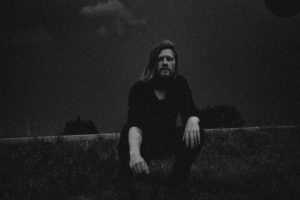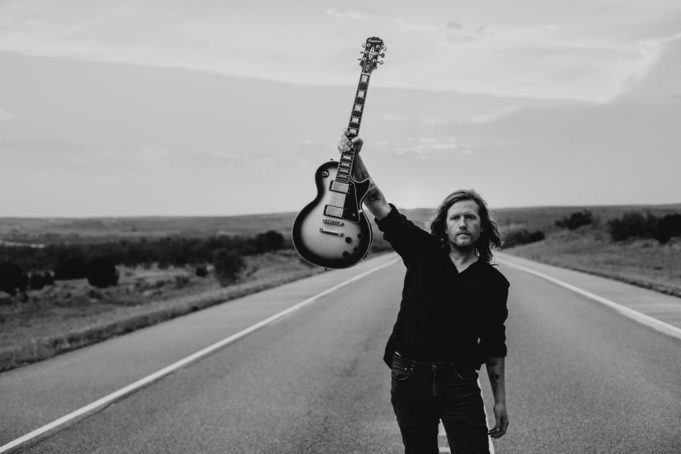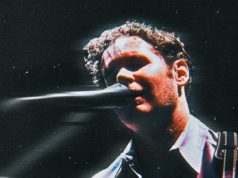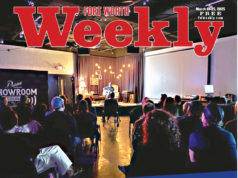There’s always been a sticky commingling between classic C&W and rock music that has existed in so-called alt-country, or Americanan, or whichever other buzzy, ill-defined music journalism label currently being applied to the Pat Greens of the world. It’s not a new thing that music might feature both a sad pedal steel and a distorted guitar. However, with the progression of big name acts like Chris Stapleton, Sturgill Simpson, and Jason Isbell increasingly incorporating rock riffs, anthemic choruses, and a startling lack of twang in their vocal delivery, they seem to be dipping their boots well past the proverbial toes into the murky sweat-scented waters of straight-up rock ’n roll.
From the starting point of slow-strummed, tear-in-my-beer acoustic waltzes, even these otherwise innocuous changes might seem jarring, but when your music already resides a bit further down the country/rock continuum, a big leap to the left of the dial makes the output all the more heavy and ever louder. Which is why, when Denton singer-songwriter Daniel Markham decided to crank up, the results have gone all the way to the extreme end. With his latest record, Burnout, Markham offers a 12-song collection of chunky, Godzilla-sized, riff-fueled ’90s nostalgia that is infinitely more Melvins than it is McMurtry.

“If you listen to my records, I’ve always done rock stuff,” Markham said. “I guess I get lumped in with the singer-songwriter thing just because I go by my name. I kinda started in that realm, but my band has really always been a rock band. When I started writing these songs, I was like, ‘I’m just going to be over the top and really dig into my teenage years and play riffs and stuff that sounds like something I would have listened to when I was a kid.’ ”
Markham said that the genesis for the record that began about two years ago came from the purchase of a new guitar. Always a fan of groove metal pioneers Pantera, on a lark, he bought a Dimebag Darrell signature model Dean ML, complete with lightning bolt graphic.
“I took it out of the box, took the bubble wrap off of it, and the first thing I played was the riff for the song ‘Burnout,’ ” he explained. “It just came to me just straightaway, so I was like, ‘Well, I wrote that song. Let me write a bunch of others.’ I was really just going for it.”
And go for it, he does. The riffs on Burnout recall the standard mid-scooped, hard rock oeuvre any budding guitarist in the latter part of the previous century would have learned off tab printed in Guitar Player magazine. The lines are both legitimately headbanging and a little comically amusing. “That riff on ‘Strawberry’ is just ridiculous,” Markham said with a laugh. But what could have been perceived as pure borderline campiness is matured and grounded by Markham’s warm and developed vocal style. The tenured harmonies and comfortable feel of his voice somehow make the chuggy guitar parts make sense. It’s the sort of trick only a seasoned and confident songwriter could pull off.
“This was the first time I’ve really gone for the fully blowed-out guitar sound and just big dumb drums,” he said. “It’s different for sure, but it’s still me. I think the songwriting is still in the vein of what I’ve been doing. It’s just that I’ve gone farther than I’ve gone before.”
Burnout was tracked by Justin Collins (Hares on the Mountain, Tony Ferrarro & The Satans of Soft Rock) at Denton’s Satisfactory Recording Co. Markham played every instrument on the album Dave Grohl-on-first-Foo-Fighters’-record-style. All tracking was completed in just over 20 hours. Mixing was done by Elmwood Studios’ Alex Bhore (Unspell, BULLS).
Though the album was released just two weeks ago, Markham said he’s already ready to move on. The Dime Dean was sold, having exhausted its usefulness, and he already has a new album in the can. With the working title Pony Drones, Markham’s next effort was recorded in an abandoned grocery store in Turkey, Texas, and is yet another departure for him. Sonically, the “vibey, stripped-down affair,” as he described it, is said to have adopted the aesthetics of that West Texas town where it was recorded and the area he grew up in around Rotan.
“Burnout was kind of an anchor for me, and I just had to get it out there,” he said. “I’ve always just kind of moved on to the next thing. Pony Drones is sort of like the other side of Burnout. Like the other side of the bar. Maybe outside. Way past the alley.”












